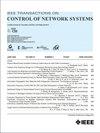受输入饱和影响的离散-时间异构线性系统的全球两方输出共识:无模型方法
IF 4
3区 计算机科学
Q2 AUTOMATION & CONTROL SYSTEMS
引用次数: 0
摘要
在本文中,我们提出了一种无模型的方法来解决受加权有向网络输入饱和影响的离散时间异构多智能体系统的二部输出一致性问题。我们提出了分布式参考发生器和基于低增益方法的控制律,用于系统中的每个跟随体。我们证明了所有的控制律共同实现了半全局二部输出一致性。在此基础上,提出了一种q -学习算法来获取控制律中的低增益参数和反馈增益矩阵。本文还提出了一种基于输出跟踪误差的在线更新算法来获取控制律中的前馈增益矩阵。因此,这些控制律不再依赖于线性系统的动力学。我们证明了在线更新算法过程中的输入饱和不影响算法的收敛性。由无模型算法计算的控制律可以防止输入饱和的发生,从而使异构多智能体系统达到全局二部输出一致。最后,通过数值算例对理论结果进行了验证。本文章由计算机程序翻译,如有差异,请以英文原文为准。
Global Bipartite Output Consensus of Discrete-Time Heterogeneous Linear Systems Subject to Input Saturation: A Model-Free Approach
In this article, we propose a model-free approach for solving the bipartite output consensus problem of discrete-time heterogeneous multiagent systems subject to input saturation over a weighted directed network. We propose both a distributed reference generator and a control law based on the low-gain approach for each follower agent in the system. We show that all the control laws together achieve semiglobal bipartite output consensus. Furthermore, we present a Q-learning algorithm to obtain both the low-gain parameter and the feedback gain matrix in the control law. We also present an online output-tracking-error-based updating algorithm to obtain the feedforward gain matrix in the control law. Thus, these control laws no more rely on the dynamics of linear systems. We show that the input saturation during the online updating algorithm does not affect the convergence of the algorithm. The control laws calculated from the model-free algorithms can prevent input saturation from occurring, and thus, the heterogeneous multiagent systems achieve global bipartite output consensus. Finally, we provide a numerical example for validating the theoretical results.
求助全文
通过发布文献求助,成功后即可免费获取论文全文。
去求助
来源期刊

IEEE Transactions on Control of Network Systems
Mathematics-Control and Optimization
CiteScore
7.80
自引率
7.10%
发文量
169
期刊介绍:
The IEEE Transactions on Control of Network Systems is committed to the timely publication of high-impact papers at the intersection of control systems and network science. In particular, the journal addresses research on the analysis, design and implementation of networked control systems, as well as control over networks. Relevant work includes the full spectrum from basic research on control systems to the design of engineering solutions for automatic control of, and over, networks. The topics covered by this journal include: Coordinated control and estimation over networks, Control and computation over sensor networks, Control under communication constraints, Control and performance analysis issues that arise in the dynamics of networks used in application areas such as communications, computers, transportation, manufacturing, Web ranking and aggregation, social networks, biology, power systems, economics, Synchronization of activities across a controlled network, Stability analysis of controlled networks, Analysis of networks as hybrid dynamical systems.
 求助内容:
求助内容: 应助结果提醒方式:
应助结果提醒方式:


